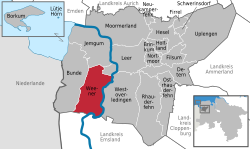Top Qs
Timeline
Chat
Perspective
Weener
Town in Lower Saxony, Germany From Wikipedia, the free encyclopedia
Remove ads
Weener (German pronunciation: [ˈveːnɐ] ⓘ) is a town in the district of Leer, in Lower Saxony, Germany. It is situated near the border with the Netherlands, on the river Ems. The town's population is at 15,654, making it the largest town of the region Rheiderland. It has a railway and autobahn connection to Groningen, Netherlands, Emden and Bremen.
You can help expand this article with text translated from the corresponding article in German. (December 2025) Click [show] for important translation instructions.
|
The city was first mentioned in a monastery's records in 951.
Remove ads
Town
Division of the town
The town of Weener consists of 9 districts:
- Weener
- Kirchborgum
- Diele
- Vellage / Halte
- Stapelmoor
- Holthusen
- Weenermoor / Möhlenwarf
- St. Georgiwold
- Beschotenweg
Neighbouring communities
In the district of Leer:
In the district of Emsland:
Politics
Mayor
- 2006–2014: Wilhelm Dreesmann
- 2014–2021: Ludwig Sonnenberg
- 2021–incumbent: Heiko Abbas
Town Council
This section needs to be updated. (November 2021) |
The composition of the town council for the 2021-2026 electoral period is:
International relations
Weener is twinned with:
Demographics
Statistics are as of December 31 of each year:
- 1980 – 14.115
- 1985 – 14.245
- 1990 – 14.320
- 1995 – 14.831
- 2000 – 15.338
- 2001 – 15.406
- 2002 – 15.534
- 2003 – 15.625
- 2004 – 15.666
- 2005 – 15.602
- 2018 – 16.276
Climate
Weener is in a temperate climate zone, influenced by the North Sea. During the summer, the temperatures are lower than those in the rest of Germany. In winter, the temperatures are higher than the other regions.
Previous residents
Recent findings published in the academic periodical Zeitschrift für Geschichtswissenschaft[3] (Journal of Historical Studies) by the German historian Jürgen Matthäus, show that Jakobus Onnen, a German citizen born in the adjoining hamlet of Tichelwarf and is erroneously listed as a war victim on the memorial located at the Heimatverein Rheiderland museum in Weener[4] is the perpetrator photographed[5] in "The Last Jew in Vinnitsa" This massacre was most likely carried out on 28 July 1941 in Berdychiv by the Einsatzgruppe C, a mobile death squad of the Nazi SS, of which Jakobus Onnen was a member.
Remove ads
References
External links
Wikiwand - on
Seamless Wikipedia browsing. On steroids.
Remove ads







